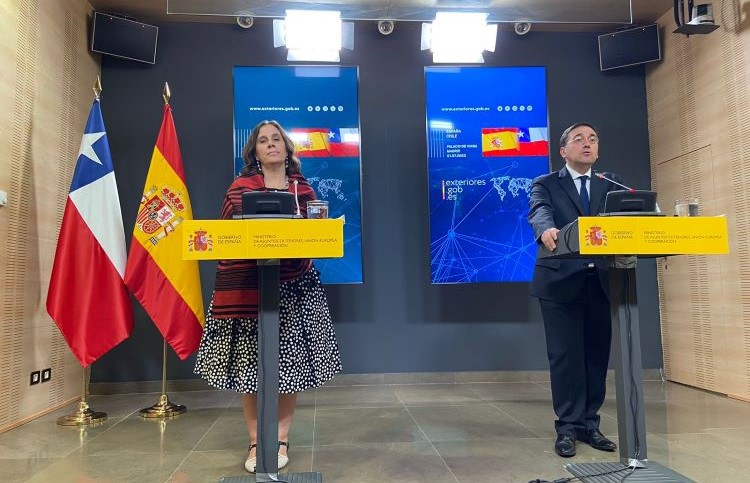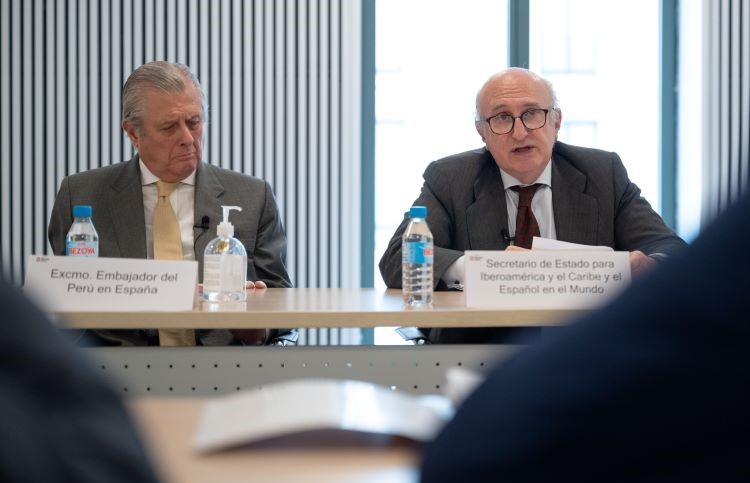The Diplomat
The Minister of Foreign Affairs, José Manuel Albares, yesterday received his Chilean counterpart, Antonia Urrejola, in Madrid, who announced that the President of his country, Gabriel Boric, hopes to visit Spain in the coming months.
Boric took office last March, in a ceremony attended by His Majesty the King, accompanied by the Second Vice-President and Minister for Employment, Yolanda Díaz, and the Minister for Equality, Irene Montero, both from Unidas Podemos, a coalition with which the new Chilean President maintains a close relationship.
Yesterday, in their first face-to-face contact, since the Spanish Foreign Minister was unable to attend Boric’s inauguration in Santiago de Chile due to the war in Ukraine, Albares agreed with Urrejola in defending dialogue between the government and the opposition in Venezuela so that “democratic and free elections” can be held.
“Spain’s position is clear, what Spain wants is that there be a dialogue between Venezuelans and that it be the Venezuelans in free, democratic and competitive elections who decide who should be their president,” said Albares during a joint press conference with Urrejola at the Palacio de Viana in Madrid.
Spain “will always support the dialogue in everything it can do” and, to this end, is willing to talk with the government of Nicolás Maduro and with “all the opposition parties to try to bring about a solution through dialogue”, continued the minister, who, however, assured that the Spanish government is not carrying out any specific work to promote contacts between the parties.
In the same sense, Urrejola declared that “the priority” for the Chilean Government is “to be able to reestablish the International Contact Group that took place in Mexico, where there were two rounds of negotiations”. “We understand that the Lima Group and the exclusion of Venezuela in multilateral forums has not been a solution and, from that perspective, our first priority is to be able to reestablish the International Contact Group,” she explained. “We hope that this space for dialogue and conversation is resumed with a view to Venezuela being able to have a process of democratic elections in accordance with the standards in this matter,” she added.
“Chile is a receiving country of almost half a million Venezuelan migrants and the migratory crisis in Venezuela will not have a solution” if the other countries of the region “do not talk with Venezuela to seek a joint solution to both the migratory crisis and the crisis in Venezuela”, warned the Foreign Minister, who assured that the “turn” that Chile is experiencing towards Venezuela since the arrival of President Gabriel Boric to the Palacio de La Moneda does not prevent her Government from continuing to condemn “the violations of Human Rights”.
On the other hand, and with regard to bilateral relations, Albares assured that Spain “welcomes the ambitious agenda of the new Chilean government, with which we want to collaborate” on issues such as human rights, gender equality and multilateralism. For her part, Urrejola confirmed that “dates are being studied” for a possible visit by Gabriel Boric to Spain “within the next few months”.
Antonia Urrejola is the first high-ranking official of Gabriel Boric’s government to visit Spain, although she had already been in contact with the State Secretary for Ibero-America, Juan Fernández Trigo, when he visited Chile in February, weeks before Boric took office.
On Thursday, during her intervention in the Efe Tribune at Casa de América, Antonia Urrejola announced her government’s intention to sign an agreement with Spain in “matters of feminist foreign policy”, an issue in which “Spain is ahead of us and has offered us cooperation”. “In Chile we are still in our infancy and, in that sense, Spain can support us in building a feminist foreign policy that lasts over time,” she declared.
She also expressed her desire to resume the bilateral agenda with Spain, a country that is, for Chile, “a gateway to Europe”. During her stay in Madrid, Antonia Urrejola was received by the Minister for Social Rights and Agenda 2030 and leader of Podemos, Ione Belarra, and held meetings with Spanish businesspeople and the Chilean community in the country.







